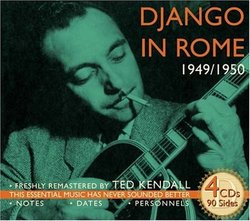| All Artists: Django Reinhardt Title: Django in Rome 1949-1950 Members Wishing: 4 Total Copies: 0 Label: Jsp Records Release Date: 4/20/2004 Album Type: Box set Genres: International Music, Jazz, Pop Styles: Europe, Eastern Europe, Swing Jazz, European Jazz Number of Discs: 4 SwapaCD Credits: 4 UPCs: 788065901929, 724382744726 |
Search - Django Reinhardt :: Django in Rome 1949-1950
 | Django Reinhardt Django in Rome 1949-1950 Genres: International Music, Jazz, Pop
|
Larger Image |
CD Details |
CD ReviewsA worthy addition to JSP's first two Django box sets Konchog | Arizona, USA | 02/07/2006 (5 out of 5 stars) "This is JSP's third great box set of Django Reinhardt recordings, and anyone who likes jazz guitar or just great music in general has to really appreciate their contribution. Taken together, these three sets provide a fairly complete (and very skillfully remastered) compilation of most of Django's known recordings. I first hesitated to get this third set (Django in Rome 1949-1950) because many of the songs were included in "The Indispensable Django Reinhardt" which I already owned. Having listened to it now, though, I have no regrets about the purchase. Not only is the sound quality much better than "The Indispensible Django Reinhardt," but the additional songs included turn out to be many of Django's best recordings. Of the four disks, the first three consist mainly of Django playing in 1949 in Rome with his old partner on violin, Stephane Grappelli, and the last disk contains recordings in 1950 with another old friend, Andre Ekyan, on alto sax and clarinet. In both cases the soloists are backed by competent Italian backup bands consisting of piano, bass and drums. Many of the recordings with Grappelli, in particular, rank with the very best of the original Quintet of the Hot Club of France, and it's quite interesting to see how they rework some of the same songs that they'd first recorded together a decade earlier. One thing that should be mentioned is that, contrary to the title shown on the Amazon page, these are not live recordings and the name on the box set itself doesn't say "live." It would be great to have a box set like this of live recordings of Django Reinhardt and Stephane Grappelli, but as far as I know nothing like that exists. In any case, it's at least fortunate that so many remarkable studio recordings have been preserved and now remastered." Five Stars B. Nesbitt | Arkansas | 01/30/2009 (5 out of 5 stars) "Don't expect the perfectly executed Django solos of the War Years or the Hot Club here. And it's not yet the bebop Django of a year or two later. The Rome set features a Django that sometimes bordered on sloppy, was showing some bebop influence, and had left far behind the "pompe" rhythms of the Quintette. The best I can come up with for his playing on this set is "relaxed brilliance." He's much closer mic'ed than earlier recordings, and the Selmer guitar sparkles throughout the acoustic recordings with Grappelli. He casually takes us along on his unending exploration for the coolest intervals and hottest runs. Occasionally he drops a note, but the ones he hits are amazing.
By now, Grappelli was a recognized virtuoso, and demonstrates it well throughout. What surprised me was the nicely done stride piano by one Gianni Safred -- no Art Tatum, but jumps pretty well. One critique I'd have would be that the band seemed to use pretty much the same four bar piano intro (1/3, 2#dim, 2m, 5) on a bunch of these songs. The feel is much more modern than the Quintette sets, but still swings. The 1950 Ekyan recordings are even more modern, featuring Django on electric -- I assume it's the Selmer with a pickup? -- if it's not a completely different guitar, it sounds like one. But Django tears it up, playing some dazzling solos. Ekyan I can pretty much do without. Overall, a very listenable set. No scratchy archival recordings -- most of it is very clear and well-recorded. I think it might appeal to the jazz fan, because it fits more in the mold of "early jazz" than the Hot Club stuff, much of which was more ragtime than jazz. I prefer the sets with Grappelli, mostly because I'd rather listen to his fiddle than Ekyan's sax. Strong buy." |

 Track Listings (23) - Disc #1
Track Listings (23) - Disc #1